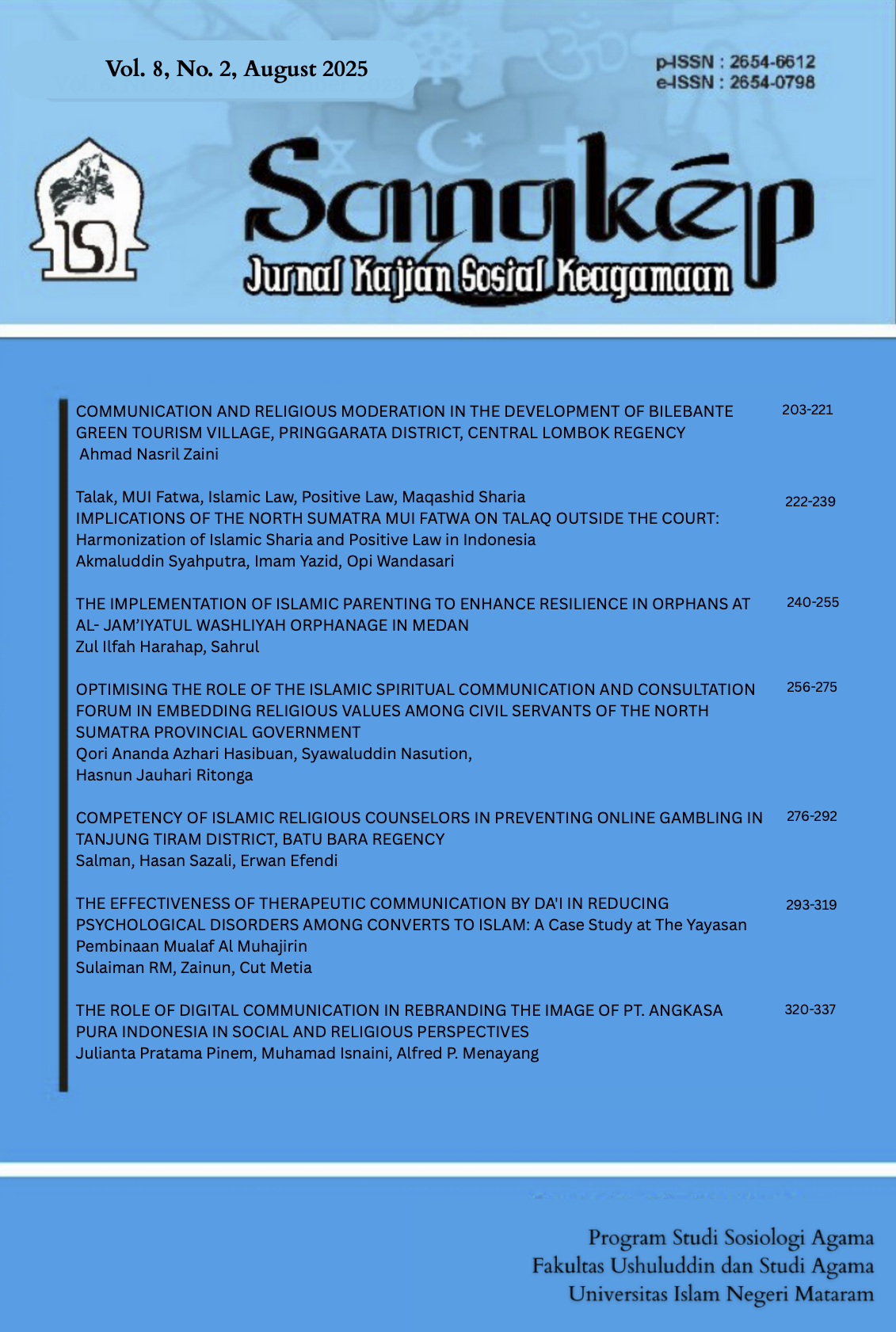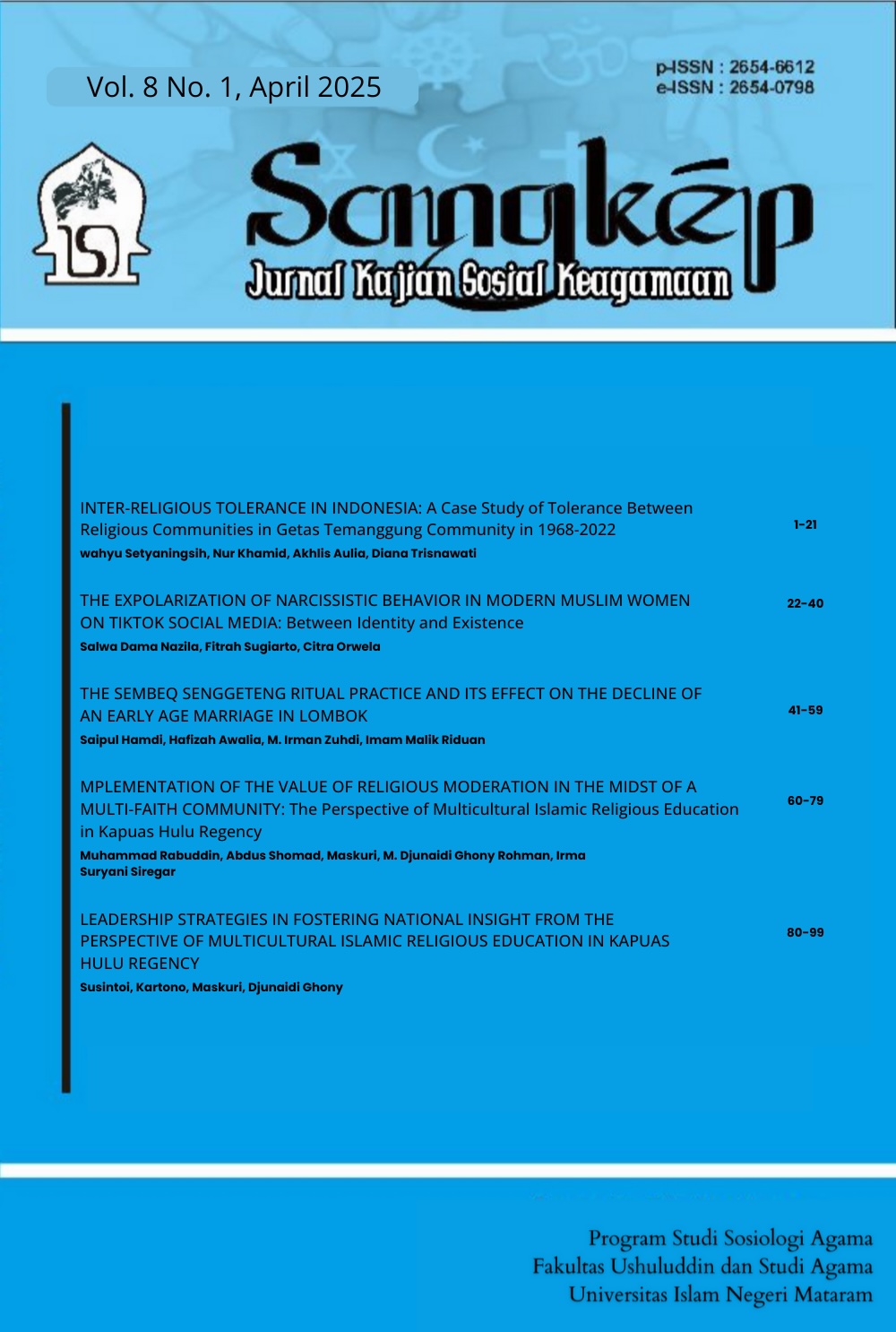The Interconnection of Communication, Identity, and Social Justice in a Multicultural Context
Vol. 8 No. 3 (2025)
These articles delve into various facets of communication within multicultural contexts, exploring interfaith practices, cultural diversity, and social development in Indonesia. They emphasise the importance of ethical and inclusive communication for fostering interfaith relationships, as seen in Karl-Otto Apel’s approach to interreligious dialogue and the Hindu community’s interactions in Kutai Kartanegara. The studies also highlight the role of adaptive da’wah management in shaping youth development and addressing legal challenges, such as the fulfillment of child support rights post-divorce. Furthermore, they reflect on how cultural inculturation, identity negotiation, and the integration of social and religious values contribute to social resilience. Ultimately, the findings call for more effective social and legal reforms to promote justice, inclusivity, and equity in multicultural societies, ensuring that diverse communities can coexist harmoniously and sustainably.
Religion and Society in the Digital Age: Communication, Moderation, and Social Resilience
Vol. 8 No. 2 (2025)
This issue features ten original research articles, authored by 25 scholars from Indonesia. This article examines contemporary socio-religious dynamics across diverse settings, ranging from green tourism villages to digital platforms, with a focus on religious communication, moderation, and the reinforcement of social resilience. The studies highlight the strategic roles played by preachers, counsellors, educators, and local communities in fostering inclusive spiritual values, preventing deviant behaviour, and responding to psychosocial challenges, particularly among vulnerable groups such as converts to Islam and orphans. Additionally, the articles examine how social media, religious-based work ethics, and the involvement of religious institutions and corporations contribute to the shaping of identity and public ethos. Collectively, this body of work represents a collaborative effort to ground religious values in social practices that are responsive and adaptive to the demands of a rapidly changing era.
Tolerance and Cultural Dynamics in Indonesia: Religious, Social, and Cultural Transformations
Vol. 8 No. 1 (2025)
This issue features six original research articles, authored by 33 scholars from three countries: Indonesia, Malaysia, and Australia. The ten articles collectively address socio-religious and cultural transformation in Indonesia. Key topics include interfaith tolerance, religious moderation, and leadership strategies grounded in multicultural education. The articles also examine contemporary issues such as the portrayal of Muslim women on social media, the influence of digital algorithms on local culture, and the role of mothers within the Merdeka Curriculum, all of which illustrate evolving public identities. Furthermore, analyses of Islamic economics, including Musyarakah Mutanaqisah contracts, Islamic boarding school initiatives, and traditional ritual practices, highlight the interconnection of religion, culture, and social development. Collectively, these studies highlight the significance of dialogue, collaboration, and value adaptation in Indonesia's pluralistic society.
Building Tolerance and Inclusivity in Indonesian Society
Vol. 7 No. 3 (2024)
This issue features six original research articles, authored by 27 scholars from Indonesia. This collection of articles explores the essential themes of tolerance, cultural preservation, and inclusivity within Indonesian society. It highlights the role of the Marsialapari tradition in character building and fostering tolerance among communities. The significance of ritual communication as a means of preserving cultural identity is examined, alongside the challenges faced by children from broken homes in Janjimatuogu Village. The relevance of Abdurrahman Wahid's pluralism is discussed as a framework for promoting religious moderation among Generation Z. Additionally, the articles address public relations strategies in local government conflicts, the inclusiveness of character education in Islamic boarding schools, and the paradigm of inclusive education in Lombok. The discourse on women's roles in social life, viewed through Fazlurrahman's perspective, and the cohesiveness of the Watu Telu Islamic society in preserving traditions further enrich the dialogue. Lastly, the impact of device use post-online learning on academic performance is analyzed, reflecting the evolving educational landscape. Together, these studies underscore the importance of fostering tolerance and inclusivity in a diverse society.
Social Change and Educational Dynamics in Contemporary Indonesia
Vol. 7 No. 2 (2024)
This issue features five original research articles, authored by 26 scholars from Indonesia. This collection of articles examines the interplay between technological growth, social change, and educational practices in Indonesia. It highlights the impact of technology on mothers in Aek Hitetoras, exploring how advancements influence their roles and social dynamics. The influence of communication in sex education among university students is analyzed, aiming to reduce cases of free sex. Additionally, the response to the MUI Batubara fatwa on marriage practices reflects community engagement with religious authority. The articles also delve into mental health issues among students from broken homes, the effects of phone snubbing on social interactions, and the role of prophetic teachings in preventing gadget addiction in children. Furthermore, the clash between religion, medicine, and local beliefs in Raja Ampat illustrates the complexities of cultural practices. Together, these studies provide insights into the challenges and opportunities facing Indonesian society in a rapidly changing world.
Promoting Peace and Cultural Integration in Indonesia
Vol. 7 No. 1 (2024)
This issue features five original research articles, authored by 27 scholars from Indonesia. This collection of articles explores the vital role of interreligious dialogue and cultural integration in fostering peace and preventing violence in Indonesia. It highlights the implications of dialogue between figures like Armada Riyanto and Pope Francis as a foundation for anti-violence efforts. The historical context of Muhammadiyah's challenges in Aceh amidst religious contestation is examined, alongside the acculturation of Islam with local traditions, such as buffalo sacrifice in Lombok. Additionally, the articles discuss peace education initiatives for young interfaith communities, the significance of traditional clothing in the Sasak tribe, and the role of opinion leaders in promoting green tourism. Together, these studies underscore the importance of communication, cultural practices, and community engagement in building a harmonious society.
Religious Moderation and Cultural Dynamics in Indonesia
Vol. 6 No. 2 (2023)
This compilation of articles delves into the multifaceted relationship between religious moderation and cultural practices in Indonesia. It highlights the concept of wasatiyyah (moderation) in fostering harmonious coexistence among diverse religious communities. The studies examine the role of youth in rural da'wah efforts, the legacy of Gus Dur in promoting social harmony for religious minorities, and the cultural constructs of the Sasak community in addressing child marriage. Additionally, it explores the challenges faced by Sasak migrant workers and the impact of new media on public relations in higher education. Together, these insights illuminate the ongoing dialogue between tradition and modernity in Indonesia's diverse society.
Addressing Radicalism and Cultural Dynamics in Indonesia
Vol. 6 No. 1 (2023)
This collection of articles examines the complex interplay between radicalism, cultural practices, and social dynamics in Indonesia. It explores the transformation of radicalism among ex-convicts in terrorism-affected areas, highlighting the challenges of deradicalization, particularly for children of former militants. The expansion of Tablighi Jamaat within the Wetu Telu indigenous community is analyzed, alongside the intersection of religion and customary law in Sasak wedding traditions. Additionally, the articles address the Indonesian inheritance system through various legal and gender perspectives, psychosocial support challenges in Mataram, and the responses of boarding schools to the COVID-19 pandemic. Together, these studies provide valuable insights into the ongoing efforts to foster social cohesion and address the challenges posed by radicalism in Indonesia.


















